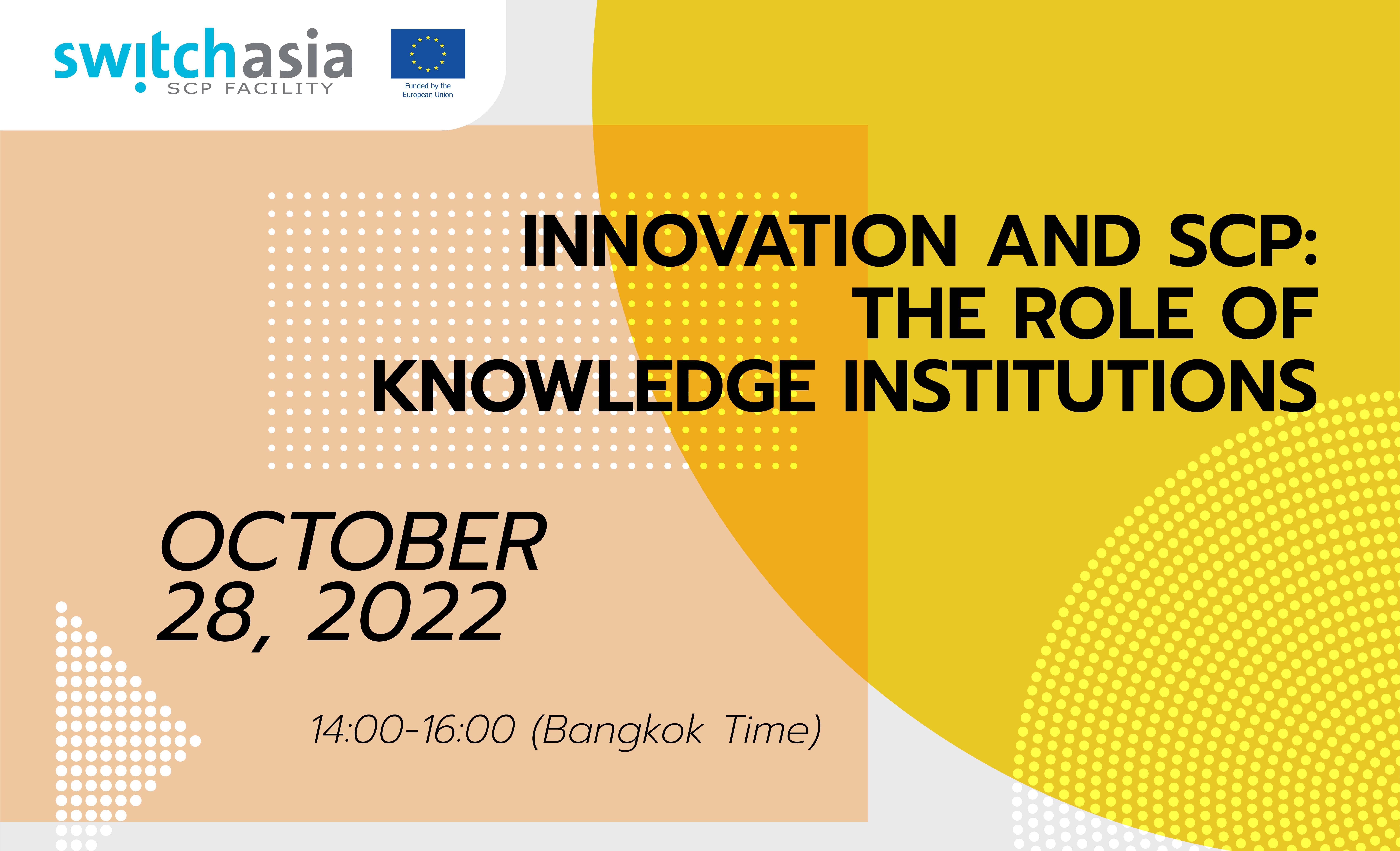
When: 28 October 2022 I Time: 14:00-16:00 (Bangkok Time) I Watch Recording HERE
Background
Knowledge Institutions (KI) are key players that supply the information, analysis, and knowledge co-creation that supports the transformation to SCP systems across sectors and lifestyles. They are central actors in any preparation for or response to emerging crises. They are also often the starting point for innovative adaptations to the ways in which we think and talk as societies about present and future crises and how we can better ensure that our planning and responses leave no one behind.
KIs come in many forms, from research institutes, universities, and reference libraries to government units, private research and development divisions, and third sector think (and do) tanks. Their work ranges across scales from hyper-local and local studies and pilot projects, to national policy analyses and capacity building, and global systems and policy analyses. Their outputs encompass products from the academic sphere (e.g., theory and research papers) to the analytical (e.g., case studies, market and policy analyses) and practical (pilot projects, resources for capacity building and communication). Knowledge institutions boast a wide range of connections to the constellation of actors working on SCP. Indeed, KIs are often arranged as part of national and global networks of learning and knowledge transmission. These networks share knowledge across actors and scales, helping to ensure that information and analysis (as well as capacity support) flows to those practitioners who can implement it effectively. Broadly speaking, networks can be categorised into three types, each acting to support a different array of practitioners in the SCP sphere. First are the networks consisting of academic institutions, departments, think tanks, and individual researchers. Second are the networks of upscalers, operating closer to the ground and comprising innovators and entrepreneurs, think and do tanks, and a wide range of actors embedded in business schools, incubators, and civil society organisations. Finally, there are networks of governments, ministries, bureaucratic units, international organisations, and policy-focused think tanks.
Discussion Points
In the context of knowledge institutions and their role as innovation hubs that supports the transition to sustainable consumption and products across sectors and scales, the Webinar will seek to examine the innovation ecosystem from several perspectives. Some potential points of discussion my include, but are not limited to:
Generation
- The role of academia as investigator-driven sources of innovation and knowledge generation;
- Collective innovation across knowledge institutions, constituencies, and scales;
- Partnering with business communities to develop new models and help de-risk innovation.
Upscaling
- Information exchange and learning through networks;
- Capacity building and Communication tools for diverse constituencies;
- Business engagement, support, and co-experimentation;
Policy Landscape
- Innovations feeding into the global policy landscape, shaping global agreements and agendas;
- Regional policy alignments that facilitate the uptake of innovations across productive clusters and in developing country contexts;
- Supporting the development and expansion of local innovation ecosystems.
Speakers
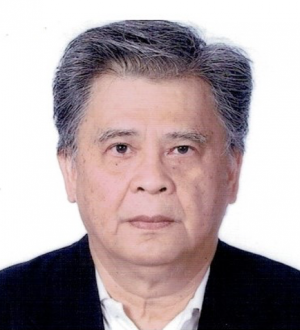 Prof. Dr. Mario T. Tabucanon, Emeritus Professor, Asian Institute of Technology, Visiting Professor, United Nations University Institute for the Advanced Study of Sustainability
Prof. Dr. Mario T. Tabucanon, Emeritus Professor, Asian Institute of Technology, Visiting Professor, United Nations University Institute for the Advanced Study of Sustainability
Prof. Dr. Mario T. Tabucanon is Emeritus Professor at the Asian Institute of Technology based in Thailand, where he served in the faculty for more than 30 years and held senior leadership positions including Provost and Acting President. He has a long association with the United Nations University Institute for the Advanced Study of Sustainability (UNU-IAS), Tokyo, Japan serving as Visiting Professor through his advocacy and promotion of Education for Sustainable Development (ESD) in the region and globally. He is internationally recognized for his academic and research contributions in the field of Industrial Systems Engineering and Management, especially for his impactful achievements in the development and applications of Multiple Criteria Decision Making methodologies and modeling tools to solve managerial and sustainability-oriented problems. He led the creation of various professional networks including the International Society of Environmental and Rural Development (ISERD) in which he served as its Founding Presidentand continued to hold the office to the present.
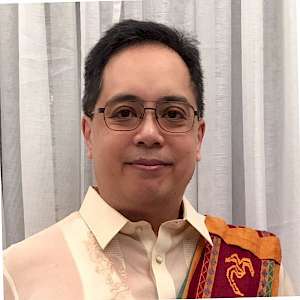 Benedict Juliano, Unit Head at the Southeast Asian Regional Center for Graduate Study and Research in Agriculture (SEAMEO-SEARCA)
Benedict Juliano, Unit Head at the Southeast Asian Regional Center for Graduate Study and Research in Agriculture (SEAMEO-SEARCA)
Benedict Juliano is a Unit Head at the Southeast Asian Regional Center for Graduate Study and Research in Agriculture (SEAMEO-SEARCA) and leads the Applied Knowledge Resources Unit (AKRU), entrusted with handling 3 key service lines: 1) Publications, 2) Websites and Social Media, and 3) Library and Archives. He has over 20 years of Knowledge Management achievement with various global service and support organizations, such as Baker McKenzie, ANZ, IBM, Trend Micro and Global Sources. His hallmark has been enabling the right information to reach the right people at the right time to make the right decisions or achieve the right outcomes.
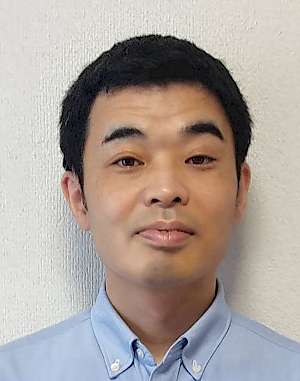 Atsushi Watabe, Programme Director, Sustainable Consumption and Production, IGES
Atsushi Watabe, Programme Director, Sustainable Consumption and Production, IGES
Atsushi Watabe has a strong background in the Sociology of Rural Development, Population Movement, and Migration in the South-east Asian Countries. He is also experienced in monitoring and evaluating environmental policies (in particular climate policies) in the developing countries. He has been engaged in the tasks as follows: Monitoring and Advisory of Indonesia Climate Change Program Loan (2008-2012), Fukushima Action Research (2012-14), UN 10-Year Framework for Sustainable Consumption and Production (2014-), and Policy Design and Evaluation to Ensure Sustainable Consumption and Production Patterns in Asian Region (2016-).
 Benjamin Lephilibert, founder LightBlue Environmental Consulting
Benjamin Lephilibert, founder LightBlue Environmental Consulting
Food Waste hacker is how to best describe Benjamin. He is the Founder of LightBlue Consulting, a pioneer UN-Awarded tech and consulting firm working since 2012 on food waste prevention across Asia, Europe, the Indian Ocean and the US with hotel groups, restaurants, government agencies, and international organizations. He is an international speaker, guest-lecturer in culinary and business schools, counselor at Franco-Thai Chamber of Commerce, solution designer of FIT Food Waste Monitoring Tech, and co-designer of The PLEDGE™ on Food Waste international certification system. He has trained more than 3000 culinary professionals and run 45 food waste prevention projects in 15 countries, and was recently awarded Global Top 30 Champions of Environmental Sustainability in Hospitality by International Hospitality Institute.
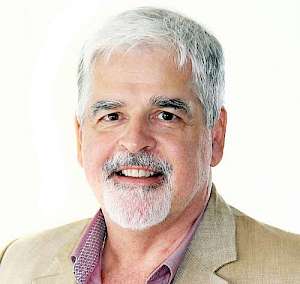 Niall O’Connor, Director Stockholm Environment Institute
Niall O’Connor, Director Stockholm Environment Institute
Niall O’Connor brings a wealth of experience to the Stockholm Environment Institute, having worked in government, academia and non-government organizations. He became SEI Asia Director in 2016, adding over 20 years of environment and development senior leadership, programme management and academic capacity to the organization. His commitment to environment and development has strong roots: As an undergraduate Niall interned in Kenya, where he developed his passion for the kind of forestry that integrates with the interests of local communities. He later returned to Africa for his Master’s agroforestry fieldwork in partnership with the World Agroforestry Centre (ICRAF). After a period of advising on farm forestry with the Irish agricultural agency, Teagasc, Niall again returned to Africa to work with the Agroforestry Research Unit for the Government of The Gambia. There, he initiated research programmes to generate agroforestry systems suited to sub-Saharan Africa’s agroecological zones.



